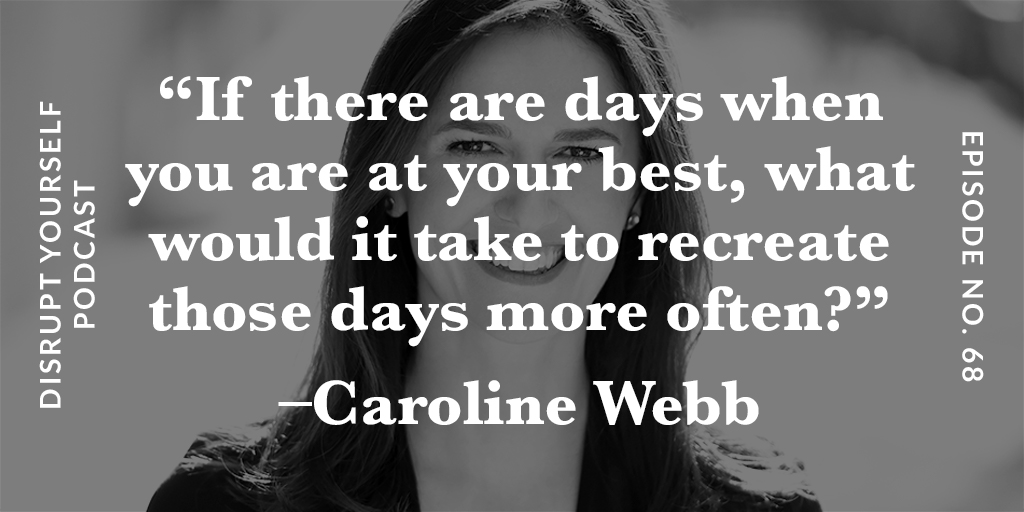If Caroline Webb looks a little tired or stressed, there is a good chance that someone will eventually turn to her and ask (with their tongue in their cheek), “Are you having a bad day, Caroline?”
Caroline laughs when she recounts this, because as the author of the book “How to Have a Good Day,” she knows that people are watching her.
“I do have days when things go wrong, there’s no question. I think I’ve learned how to bounce back from them…not least because every time something goes wrong now, I think, “Ooh, I can use that in a speech or a story!”
All joking aside, Caroline Webb has made a name for herself in helping others reframe their day and find ways to look on the bright side. As the CEO and founder of the consulting firm Sevenshift, Caroline spends her days coaching companies, teams and individuals on how small behavioral changes can lead to lasting professional satisfaction and success.

Originally a public policy analyst, Caroline recognized in her twenties that she was drawn to the “people side” of economics, and began maneuvering her way into responsibilities more in line with that interest than what she had worked on previously. Shifting to the private sector, she joined the team at the management consulting firm McKinsey, taking a job that was technically an entry-level position despite her years of experience. Caroline knew that she wanted to really learn the consulting business, and she wasn’t afraid to take a professional step back in order to spring forward.
“[I]f I think about the thing that has guided and has been sort of this drum beat throughout my life it’s definitely been this question of what I want to learn next. And that has been such a guiding assumption that if I push that to the front of my mind then I’m a little braver and a little bolder in what I choose to do next.”
Caroline has certainly learned to be bold. Join me as we discuss how she used voicemails to advance her career, her best tips for starting and ending your day in the right frame of mind, and how she used her years at McKinsey to hone her craft before bravely stepping out as an entrepreneur, author, and thought leader in how the behavioral sciences can influence the workplace. Listen in the player above, or download on iTunes. If you like what you hear, please be sure to leave a review.
Takeaways from this episode:
- Caroline found herself in a highly competitive environment in her early days at McKinsey, so she pro-actively reached out to team leaders on projects that were interesting to her to try and get staffed instead of relying on the internal staffing system. Some leaders responded well, some didn’t, but the risk allowed Caroline to move forward in the direction she wanted to go instead of relying on fate.
- Large scale transitions in companies are often the result of small scale changes in behavior. How do you have conversations about things that went wrong on a project? How do you prioritize when there is too much to do? How do you build resilience at the end of a tough day?
- If at the end of the day you focus on three good things that happened you are more likely to remember that day as having been a positive experience overall.
- If you are experiencing cognitive overload (i.e., too much is going on), remind yourself that every “yes” is a “no” to something else. “Park” things that don’t need your attention right now.
- If you want to get good at something, start practicing and living as if you are really good at it. Words said aloud come alive.
Links Mentioned in this Episode:
How to Have a Good Day: Harness the Power of Behavioral Science to Transform Your Working Life by Caroline Webb
Predictably Irrational: The Hidden Forces That Shape Our Decisions by Dan Ariely
Thinking, Fast and Slow by Daniel Kahneman
Nudge: Improving Decisions About Health, Wealth, and Happiness by Richard H. Thaler and Cass R. Sunstein
Build an A-Team: Play to Their Strengths and Lead Them Up the Learning Curve by Whitney Johnson
- Download a free chapter from Build an A-Team

